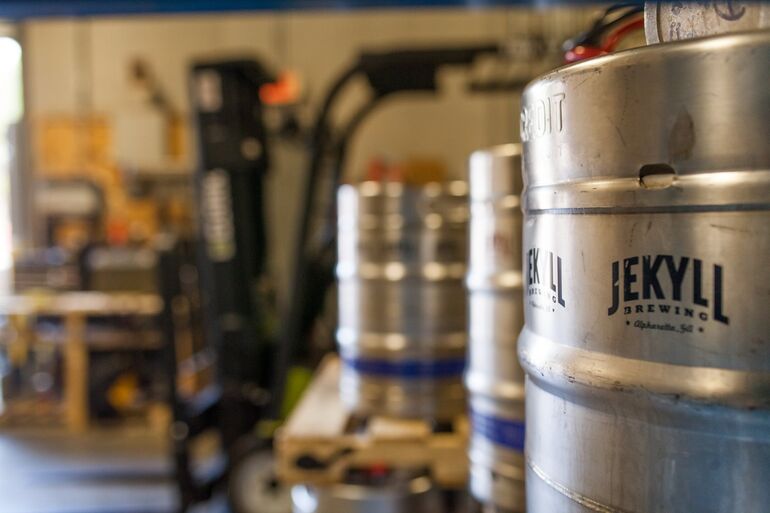Start 14-Day Trial Subscription
*No credit card required

Jekyll Brewing Makes Historically Good Beer (Issue 32)
Jekyll Brewing founder and president Michael Lundmark drew upon local Southern history to build Alpharetta, Georgia's first brewery. Just four years later, Jekyll is making its own history – one bottle at a time.
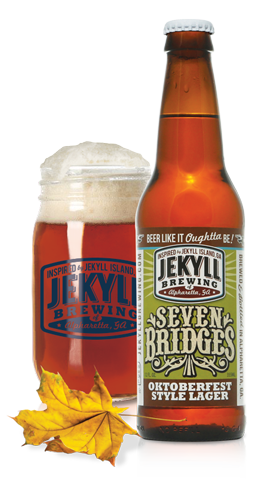
In the Beginning
The story begins with Lundmark, a former business developer brewing in his garage as a hobby circa 2012. Readily admitting his recipes needed work, he found himself regularly visiting a local homebrew supply shop and receiving critiques from a knowledgeable young employee. That employee turned out to be award-winning homebrewer Josh Rachel.
After deciding to take the leap from financial security into the depths of pint-making in 2012, Lundmark lined up investors and approached Rachel to join as Jekyll’s brewmaster. Though Rachel had been pitched before, he agreed.
Almost immediately after, Jekyll’s main investor backed out, leaving the pair scrambling to make up the difference. Rolling with the punches, the pair decided to become co-owners and set out raising the money from friends, family and a Kickstarter campaign.
Beginning late January of 2013 and running for 28 days, the Kickstarter raised around $35,000. Despite limited funds and continuous adversity, Jekyll was now a reality.
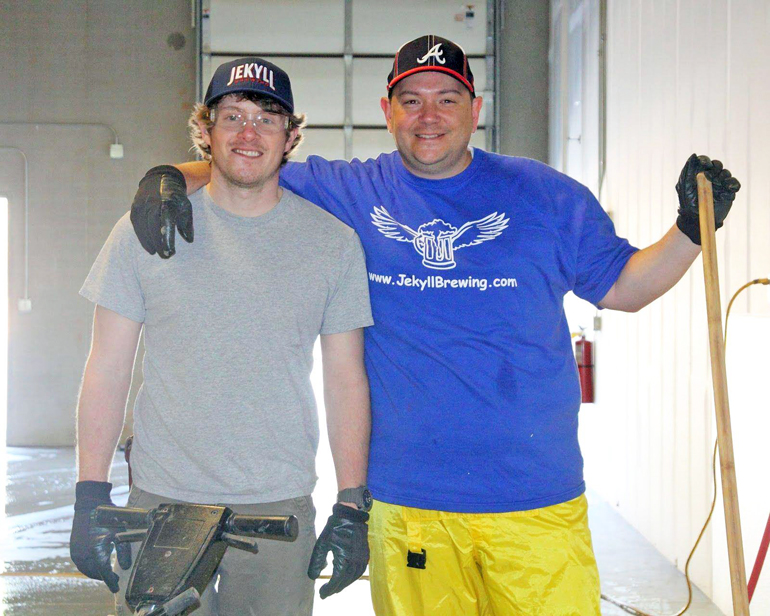
Jekyll's co-owners in the early days. Josh Rachel (left) is brewmaster and Michael Lundmark is president.
Beer and Now
In person, Jekyll’s owners are easygoing, relaxed and eager to share the brewery’s backstory. As described in fascinating detail by Lundmark, the brewery draws its name from Georgia’s Jekyll Island, which is believed to have housed the Deep South’s first brewery. Back in 1738, Major William Horton founded a brewery on Jekyll Island as a means for clean water for Georgia’s colonists. You can read the full story here, colorfully related by none other than Lundmark himself.
Lundmark and Rachel also exude a mix of what might be described as pleasant intensity and dogged resolve. These are family men who have wholly dedicated themselves to their business. As a result, their work and lives are one, and their employees are extended family.
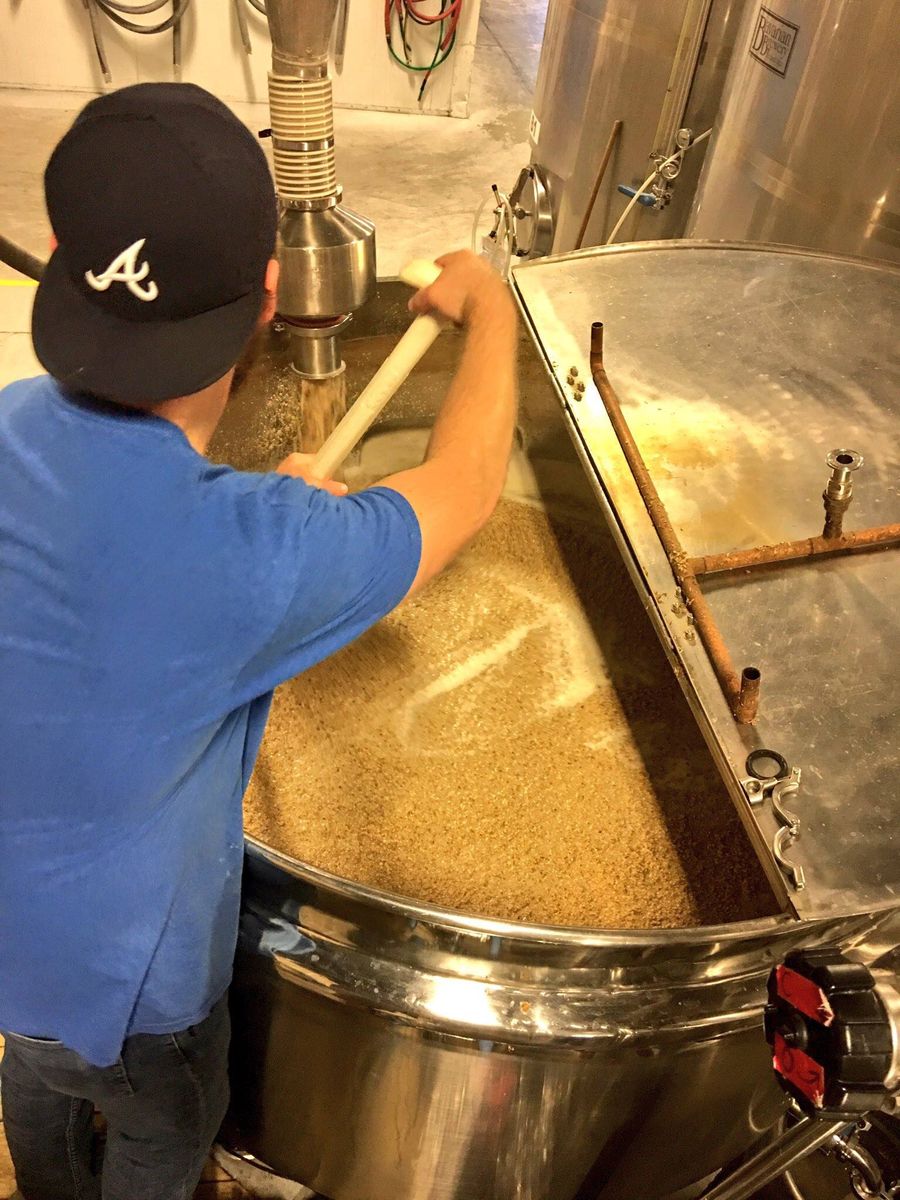 This may be the most striking element of visiting the Jekyll brewery and meeting its owners. When asked how many hours they work a week, they laugh, because the work never stops.
This may be the most striking element of visiting the Jekyll brewery and meeting its owners. When asked how many hours they work a week, they laugh, because the work never stops.
For Lundmark and Rachel, Jekyll is not a clock-punching kind of gig. It’s their journey, purposeful and for the benefit of all. There’s no turning back. Even in the beer industry, this mentality is relatively rare, and it ushers in a shift in perspective. The approach becomes more holistic, and the results can seem, for lack of a better word, divine.
The quality of Jekyll's beer is impressive – a testament to Josh Rachel and his team’s brewing prowess, and the company’s concern with not cutting corners.
From production to packaging, Jekyll Brewing functions like a well-oiled machine, but greased with elbows rather than liquid assets. Everything aspect of the business is “lived-in”. The look and feel of its product ties perfectly back into its brand without being forced. Its beers draw from Southern history without shoving it in your face, and small references to historical lore are placed on labels and six-pack carriers, inviting curiosity. There’s a wonderful backstory to the curiously named Cooter Brown ale, steeped in Civil War history, for instance.
Jekyll’s facility and taproom, located in a seemingly out of place office complex, still manages to feel lively and charming. You can sense they have spent a lot of time asking “How can we make this work, or make it work better?”, to the point where it becomes an ethos of continuous improvement.
My visit came during renovations for a new and improved taproom, just in time for Georgia’s new direct sales law to come into effect. Plans included making space for a coffee roaster, which Jekyll will use for both artisanal coffee and in its beers – another example of seamless, holistic integration.
Speaking of the beers, the quality is impressive – a testament to Josh Rachel and his team’s brewing prowess, and the company’s concern with not cutting corners. Jekyll goes the extra mile to ensure its beer stays fresh, sparing no expense for a top-dollar bottling line and packaging its flagship Hop Dang Diggity IPA in extra-tall six-pack holders to keep UV rays away.
The extra effort is worth it. In 2016, the brewery took home its first Great American Beer Festival medal – a silver for Jekyll’s Seven Bridges, a German-style Maerzen.
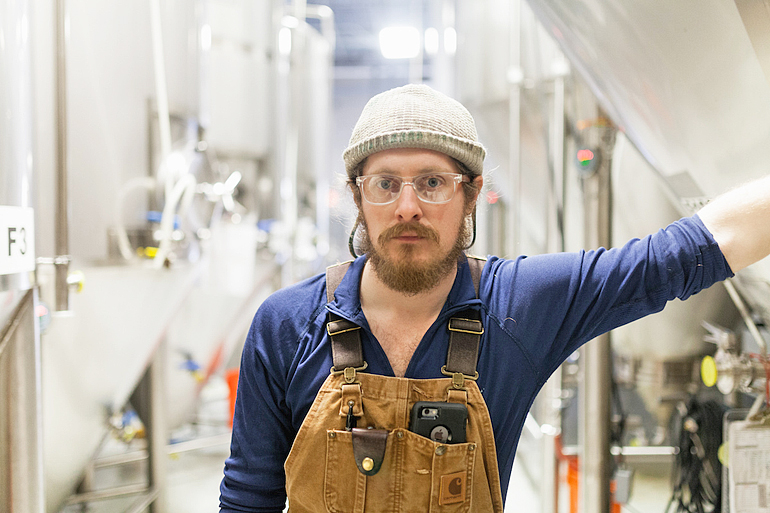
For Lundmark and Rachel (pictured), Jekyll is not a clock-punching kind of gig. It’s their journey, purposeful and for the benefit of all. There’s no turning back.
This attention to detail has helped make Jekyll one of the largest and fastest growing breweries in Georgia. But Jekyll’s success hasn’t come at the expense of character and humanity. It is far removed from the cultural sterility and aggressive ethos of certain brewers, and what it may lack in bottomless capital it makes up for in heart.
Success is typically defined by meeting concrete benchmarks, and by all accounts, Jekyll has met those benchmarks. Lundmark has already turned down multi-million dollar buyouts, but he has no intention of growing beyond the southeast. It just wouldn’t fit the brand. He does, however, hope to expand Jekyll’s charitable giving and keep the brewery in the family – a word which extends to his business partner and employees. The true success of Jekyll Brewing is that it’s here to stay and make the world a little better through beer and the community it fosters.

(Photos Courtesy Jekyll Brewing)



